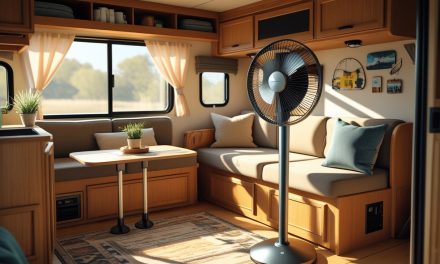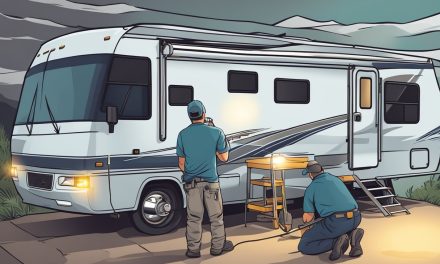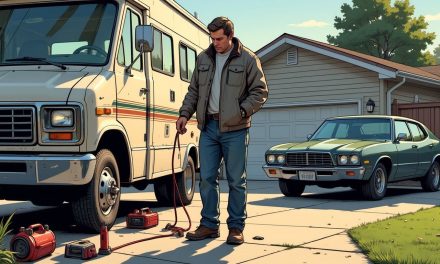Power surges can destroy your RV appliances and electronics in seconds. Campgrounds often have unstable power pedestals, making electrical safety a big concern for RVers. This post will explain if RV surge protectors are really necessary and how they keep your investment safe.
Keep reading to protect your gear with the right solutions!
Key Takeaways
- RV surge protectors shield appliances like refrigerators and air conditioners from power surges, spikes, and low voltage.
- Portable protectors are easy to use but prone to theft; hardwired ones stay installed inside your RV for added safety.
- Choose the right amp compatibility—30-amp models fit smaller RVs, while 50-amp ones handle larger rigs with more electronics.
- Some surge protectors include Bluetooth or LED displays for real-time monitoring and alert you to electrical issues fast.
- Investing in a quality surge protector is cheaper than repairing or replacing fried appliances after a power surge.
Why RV Surge Protectors Are Essential
Power spikes can fry your RV’s electronics faster than bacon on a hot skillet. A surge protector acts like a shield, keeping your appliances safe from harm.
Protection from power surges and spikes
A sudden power surge can fry your RV’s appliances and electronics. Surges often happen at camp sites or with unreliable power pedestals. A quality RV surge protector blocks excess voltage, keeping your devices safe.
Metal Oxide Varistors (MOVs) absorb the extra energy before it reaches your equipment.
Voltage spikes are sneaky and unpredictable. They may damage expensive items like RV refrigerators, security cameras, or air conditioners. Surge protectors act as a front-line defense within the 105-132 volt range to prevent chaos during your camping trip.
Safeguarding expensive RV electronics
Power surges can damage your RV electronics fast, but low voltage brings its own risks too. Your RV refrigerator, air conditioner, and other appliances rely on consistent power. Fluctuations from a faulty power pedestal or campsite overload can fry their circuits in seconds.
Surge protectors act like shields for your gadgets. They stop spikes before they reach your devices and often warn you of unsafe conditions. Some models even offer Bluetooth monitoring so you can check real-time data from inside your camper or motorhome.
With features like these, protecting your investment becomes much easier while enjoying safer RV camping trips!
Types of RV Surge Protectors
Finding the right surge protector is like picking the best shield for battle—it depends on your needs. Some offer flexibility, while others stay put, guarding your RV’s electrical system around the clock.
Portable surge protectors
Portable surge protectors are easy to use and do not need professional installation. You plug one into the power pedestal, then connect your RV’s cord. It shields your RV appliances from power surges, high voltage, and low voltage issues in seconds.
These devices are compact but powerful. They provide strong RV electrical protection for motorhomes or travel trailers on the go. Since they’re small and removable, you can carry them anywhere.
But keep an eye out; their portability makes them easier targets for theft at campsites!
Hardwired surge protectors
Hardwired surge protectors install directly into your RV’s electrical system. They stay inside, safe from theft and bad weather. Once installed, they require no setup or extra steps at each campsite.
This means you plug into the power pedestal without worrying about constant adjustments.
These provide strong surge protection for your RV appliances like the refrigerator or air conditioner. They shield against low voltage and high voltage issues too. Many models offer advanced monitoring, showing you any problems with the power supply right away.
Options from brands like Progressive Industries are popular among RVers for their reliability and long-lasting performance.
Key Features to Look for in an RV Surge Protector
Look for tools that match your RV’s needs and give you peace of mind, whether parked or on the move. A good surge protector keeps your gear safe and helps spot hidden electrical problems fast.
Amp compatibility (30 amp vs. 50 amp)
Understanding amp compatibility is critical before choosing an RV surge protector. The difference between 30-amp and 50-amp models isn’t just about numbers, it’s about your RV’s needs. Using the wrong one could damage your electrical system, and that’s a headache no one wants.
| Feature | 30-Amp Surge Protector | 50-Amp Surge Protector |
|---|---|---|
| Power Capacity | Provides up to 3,600 watts (120 volts). | Handles up to 12,000 watts (240 volts split into two 120-volt legs). |
| RV Type | Best for smaller RVs, travel trailers, or older models. | Perfect for larger RVs with bigger appliances like washers and dryers. |
| Plug Style | Features three prongs (hot, neutral, and ground). | Includes four prongs (two hot legs, neutral, and ground). |
| Cost Range | Starts at around $100 for basic models. Advanced units go up to $250. | Ranges from $150 for basic surge protectors to over $300 for EMS models. |
| Popular Brands | Progressive Industries and Southwire both offer reliable 30-amp options. | Top brands like Southwire and Progressive Industries provide 50-amp models. |
| Common Uses | Ideal for power setups with fewer electronics or single air conditioning units. | Designed for multi-AC systems, refrigerators, and power-hungry appliances. |
Would you like to save this article?
Choosing the right amp compatibility depends on your RV’s electrical system. If you’re unsure, check your RV’s power cord plug or consult the manufacturer’s information.
Monitoring and diagnostic capabilities
Good RV surge protectors do more than block power surges. They monitor voltage levels and diagnose issues like low voltage or high spikes. Many models, such as the Hughes Power Watchdog, let you track this through Bluetooth on your smartphone.
You get instant alerts if something goes wrong with the power pedestal.
Some options include LED indicators or displays showing real-time data. For example, Progressive Industries models often provide clear status updates about your RV’s electrical protection.
These features help spot problems early and protect sensitive RV electronics like your refrigerator or air conditioner from damage.
Move on to explore different types of RV surge protectors next!
Conclusion
Protecting your RV’s electronics is a smart move. Power surges can fry appliances like your refrigerator or air conditioner in seconds. A surge protector acts as a shield, keeping pricey repairs at bay.
It might seem like an extra cost, but it’s cheaper than replacing damaged equipment. Don’t let one bad campsite ruin your trip; invest in safety and peace of mind today!
FAQs
1. What does an RV surge protector do?
An RV surge protector shields your RV appliances and electronics from power surges, high voltage, or low voltage issues that can damage sensitive equipment like your RV refrigerator or other electrical systems.
2. Why is electrical protection important for my RV?
RV electrical protection helps prevent costly repairs caused by power surges or unstable voltage at a power pedestal. It keeps your investment safe while ensuring smooth operation of your RV electronics.
3. Do I need low voltage protection in my RV?
Yes, low voltage can harm devices like air conditioners and refrigerators in your RV. A surge suppressor with voltage monitoring stabilizes the supply to protect these appliances.
4. Are brands like Progressive Industries reliable for surge protectors?
Progressive Industries offers trusted options with features like Bluetooth monitoring and advanced surveillance tools to make tracking power conditions easy during rving trips.
5. Can I skip using a surge protector if the campground looks safe?
Even at well-maintained campgrounds operated by companies like Thor Industries or Winnebago, unpredictable power surges can occur without warning. A good-quality surge protector adds an extra layer of safety for peace of mind.






